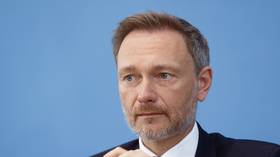Germany has no more money for EU – finance minister

Germany cannot afford to pay more money into the EU budget, Finance Minister Christian Lindner told the Die Welt newspaper on Friday. Although Germany is the bloc’s largest contributor, it has been forced to make cutbacks as its economy contracts.
"In view of the necessary cuts in our national budget, we are currently unable to make any additional contributions to the budget of the European Union," Linder told reporters in Brussels, adding that other member states have come to the same realization.
Lindner explained that the EU has maxed out its long-term budget through 2027, largely as a result of the bloc’s lavish aid packages to Ukraine. According to the latest figures from Brussels, the EU has given Kiev €72 billion ($79 billion) in economic, military, and humanitarian aid since Russia’s military operation in Ukraine began last February.
Despite this unprecedented outflow draining its coffers, the European Commission is reportedly readying an additional €72 billion financial aid package to keep the Ukrainian economy limping along to 2027. According to Lindner, the commission will release a report next week asking member states for more money to cover the bill.
Germany is the EU’s largest net contributor, contributing €21.4 billion ($23.4 billion) to the bloc’s budget in 2021. Its next-door neighbor, Poland, is the largest net drain on the budget, receiving €12.9 billion ($14.2 billion) in 2021.
Once regarded as Europe’s industrial powerhouse and the EU’s most resilient economy, Germany is currently experiencing deindustrialization as a consequence of its decision to cut itself off from cheap Russian gas and transition to more expensive green energy. The German economy fell into recession in the first three months of this year, and Chancellor Olaf Scholz’s government is planning to reveal around €20 billion ($21.8 billion) in budget cuts later this month.
However, a vote on the budget may be delayed, as Scholz and Lindner’s coalition partners in the Green party argue for tax hikes instead of spending cuts.













